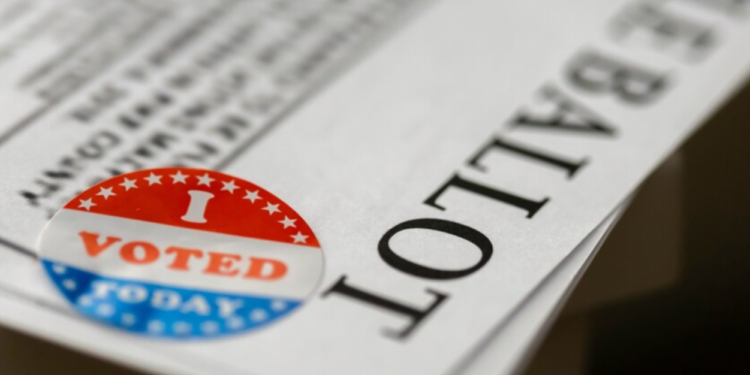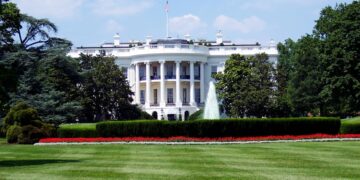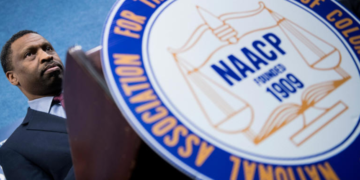April 2, 2025 Story by: Publisher
A coalition of voting rights organizations, including the NAACP, filed a lawsuit on Tuesday in the U.S. District Court for the District of Columbia to challenge President Trump’s executive order on the administrations effort to overhaul the election system.
The executive order, which Trump signed on March 25, requires stricter voting regulations in federal elections, including showing proof of citizenship when registering to vote.
“This so-called executive order is blatantly unconstitutional and designed to disenfranchise millions of lawful, eligible voters,” Derrick Johnson, President and CEO of NAACP said in a press release. “In America, Presidents do not control elections. Trump is clearly pushing the boundaries of executive power to see how much he can get away with. It’s time for the public and all elected officials to speak up as loudly as they can before our country is stolen from its people. If we hand the president control over how elections are run in America, we no longer live in a democracy. This isn’t just another executive order — it is a test to see if we allow the president to crown himself.”
The order directs the Election Assistance Commission (EAC), an independent agency of the U.S. government that supports election officials, to require people to provide documentary proof of U.S. citizenship when registering to vote to prevent noncitizens from voting.
This comes after the president and his Republican allies characterized noncitizen voting during the 2024 presidential campaign as widespread — a false claim that was debunked by experts and by a spate of GOP-led inquiries in the weeks leading up to the election, which found that noncitizen voting is extraordinarily rare.
The coalition released the following joint statement about the lawsuit, League of Women Voters et. al. v. Trump et. al.:
“The president has no constitutional or statutory authority to unilaterally dictate how elections are run. This executive order is a blatant violation of the separation of powers. Election rules are decided by Congress and the states, and any attempt by the executive branch to override their power violates the Constitution. This order, based on a persistent false and racialized narrative, could disenfranchise millions of eligible voters. It mirrors the SAVE Act, which would add unnecessary barriers to voter registration and silence the voices of American citizens. These unlawful attacks on voting rights are part of a broader effort to undermine our democracy. We have filed suit to stop this executive order and to keep it from interfering with eligible voters’ participation in our elections.”
Plaintiffs in Tuesday’s lawsuit, include organizations that advocate for voting right across the country: the National Association for the Advancement of Colored People (NAACP), Asian and Pacific Islander American Vote, the Hispanic Federation, National League of Women Voters, League of Women Voters of Arizona, League of Women Voters Education Fund and Asian Pacific American Advocates (OCA).
The complaint names Trump and EAC officials as defendants.
The lawsuit, which is known as “League of Women Voters v. Trump,” argues that the president “has no authority to make or change the rules for conducting federal elections,” — a claim that was also made in a similar federal lawsuit challenging this executive order that was filed in D.C. court on Monday by The League of United Latin American Citizens (LULAC) – the largest civil rights organization in the U.S.
“In the [Executive Order] the President attempts to usurp the power to regulate federal elections from Congress, the States, and an independent agency to which Congress delegated certain limited responsibilities,” plaintiffs argue in the “League of Women Voters v. Trump,” claiming that the president is violating the “constitutional separation of powers.”
Existing federal law, as outlined in the National Voter Registration Act (NVRA) of 1993, already requires anyone who registers to vote to swear to their citizenship under penalty of perjury, but it does not require individuals to present documents to demonstrate proof of citizenship when they register.
The executive order directs the EAC to revise its national mail voter registration form within 30 days of the order’s issuance to require voters to show proof of citizenship through a U.S. passport, a state-issued driver’s license or identification card, an official military identification card or a valid federal or state government-issued photo identification. The order mandates that all documents provided should show proof of citizenship, but many state or government-issued ID’s, including drivers licenses, don’t show an individual’s citizenship.
The lawsuit argues that requiring documentation to prove citizenship “would impose a severe burden on, if not wholly disenfranchise, millions of voters” who face various barriers, including financial and logistical, that prevent them from obtaining the required documentation.
Ahead of Trump’s inauguration, on Jan. 3, Texas Republican Rep. Chip Roy introduced H.R. 22 — legislation known as the “Safeguard American Voter Eligibility Act” or the SAVE Act — a bill that would require people to provide documentary proof of U.S. citizenship when registering to vote in federal elections.
As the U.S. House considers the SAVE Act this week, House Speaker Mike Johnson House and GOP leaders urged bipartisan support for the legislation in a statement on Monday.
“American citizens — and only American citizens — should decide American elections,” the statement says. “This legislation cements into law President Trump’s executive action to secure our voter registration process and protect the voices of American voters. We urge all our colleagues in the House to join us in doing what the overwhelming majority of people in this country rightfully demand and deserve.”

















